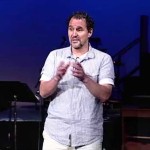We run our website the way we wished the whole internet worked: we provide high quality original content with no ads. We are funded solely by your direct support. Please consider supporting this project.
The Kingdom of God While Mowing the Lawn
The Kingdom of God is first and foremost characterized by the kind of love Jesus demonstrated on Calvary and throughout his life. Everything we do, Paul says, is to be done in love (1 Cor. 16:14). Love is the only thing that ultimately matters (Gal. 5:6; cf. I Cor. 13:1-3).
As our lives become a dome over which God reigns (the Kingdom), we grow in our capacity to imitate him, loving all others the way he loved us and gave his life for us (Eph 5:1-2).
However, most of us live highly compartmentalized lives in which we love God and others in special moments, with the bulk of our ordinary life being spent completely on ordinary things. We love God during devotional times, and love people when it occurs to us—when we’re around loved ones, or perhaps when we see a person in need. But the challenge of the Kingdom disciple is to revolt against this compartmentalization. The challenge is to collapse the distinction between the “holy” and the “secular,” and make even the most mundane aspects of our lives holy. The challenge is to fill the most insignificant details of our life with eternal significance.
Instead of loving God and others in special compartmentalized times, the challenge is to let every aspect of our ordinary life become centered on loving God and others. We’re to do everything in love.
Everything? This raises all kinds of questions: How do we love when we’re driving down the highway, or shopping at the mall, or mowing the lawn?
Kingdom love is about ascribing worth to others, at cost to ourselves when necessary. This is what God does to us on Calvary, and this is what we’re called to do to all other people at all times. We’re to agree with God that every person we see has unsurpassable worth, as evidenced by the fact that God was willing to pay an unsurpassable price for them. So, how do we do this while driving, shopping or mowing the lawn?
This brings me to what I have found to be the simplest, yet most profound and most freeing spiritual exercises I’ve ever committed myself to. I call it simply the discipline of blessing.
Many years ago a teacher (Ed Silvoso) preached at Woodland Hills Church. He drew our attention to the fact that the first task Jesus gave this disciples when he sent them out to serve and evangelize the world was to bless every house they came upon (Lk 10). This, he suggested, is our first and most basic act of loving service to the world. We are to be a people who simply express God’s love by blessing people. We are to agree with God that each and every person we see was worth Jesus dying for. And we express this first and foremost by blessing them.
After hearing this teaching, I committed to trying to do this on a moment-by-moment basis. With every person I encountered, I would think or whisper a short blessing—something like, “Lord, I agree with you that this person has unsurpassable worth and was worth you dying for. Bless them Lord.”
As I was driving down the road on the way home from church that day, I thought or whispered a quick blessing on each of the fellow drivers on the road. When a person cut me off, I caught myself instinctively thinking bad thoughts about the person. I laid these judgmental thoughts aside and prayed a little blessing on their life (and their driving skills). When I drove past my ornery neighbor’s house, instead of remembering all the nasty stuff she’d done toward me and my family over the last two years, I prayed God’s blessing on her and her family. When I went shopping with my wife a little later, I thought or whispered little prayers of blessing over people I saw. As I later mowed the lawn, I blessed whoever I saw or thought about.
Try this today and see how this pattern revolts against the ways of the world. While I still go through long periods in which I forget to bless people – I admitted I’m still pretty bad at this! – I can’t believe how this simple discipline has impacted my life.
Category: General
Tags: Blessing, Discipline of Blessing, Ed Silvoso, Kingdom Living
Related Reading

If you really want to defend the poor from Caesar, shouldn’t we use the political means that exist? It’s easy to make your argument when you are in a position of privilege.
Question: I’ve been reading your blogs for a while. I’ve read multiple texts written by you and it’s difficult to listen much longer as someone in poverty. It’s easy to make your argument when you are in a position of privilege. The Church doesn’t have the power and resources to help the poor everywhere. Christians…

How Judging Blocks Love
What keeps us from fulfilling the law of love that is exemplified by Jesus and laid out in the Scriptures (Matt. 22:39-40; Rom 13:8,10 Gal 5:14)? In a word, we like to pass verdicts. To some extent, we get our sense of worth from attaching worth or detracting worth from others, based on what we…

Sermon Clip: Love: It’s All About the Cross
In this sermon clip, Greg Boyd talks about how Colossians 3:14 and the definition of love. God designed creation so that we would live in community with God and express God’s love towards each other and creation. However, sin disconnected us from God. In this sermon, Greg shows how we were created in the image…

How Do You Handle Feelings of Being Overwhelmed? (podcast)
Greg talks about being overwhelmed. Episode 500! http://traffic.libsyn.com/askgregboyd/Episode_0500.mp3

Why the Rapture is a Bad Idea
Is the Rapture really what you think it is? Most Christians believe that God will take his followers up to heaven before the really bad stuff starts on earth, but is this what the bible says? Is this view consistent with the loving God that Jesus shows us in the New Testament? View the full…

Your Spiritual “Say-So”
In yesterday’s post, I summarized what Jesus and the rest of the Bible says about prayer. For many, that is enough. “God said it, I believe it, that settles it for me.” But for others, like myself, the practice of petitionary prayer raises a number of theological questions that need to be answered. The trouble is…

